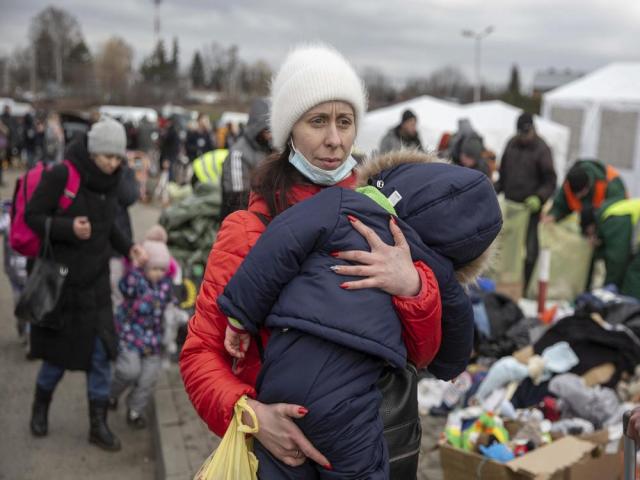Russia-Ukraine War: What To Know As Ukraine Resists Advance

There was a tense calm Monday in Kyiv, but explosions and gunfire were heard in embattled cities in eastern Ukraine as Russia’s invasion continued to meet unexpectedly stiff resistance.
The Russian military assault on Ukraine went into its fifth day after Russian President Vladimir Putin ordered his nuclear forces put on increased alert, ratcheting up tensions yet further. A Ukrainian delegation held talks with Russian officials at the border with Belarus, though prospects of any substantial outcome looked uncertain at best. French President Emmanuel Macron spoke by phone with Putin.
Meanwhile, Western sanctions triggered by the invasion sent the Russian ruble plummeting, leading ordinary Russians to line up at banks and ATMs.
WHAT’S HAPPENING ON THE GROUND?
Kyiv’s outgunned but determined troops slowed Russia’s advance and held onto the capital and other key cities — at least for the time being.
ADVERTISEMENT
Explosions and gunfire that have disrupted life since the invasion began last week appeared to subside around the Ukrainian capital of Kyiv overnight. Long lines formed outside supermarkets Monday as residents were allowed out of bomb shelters and homes for the first time since a curfew was imposed Saturday.
RUSSIA-UKRAINE WAR
Russia-Ukraine War: What to know as Ukraine resists advance
EXPLAINER: Does Putin’s alert change risk of nuclear war?
500,000+ refugees flee Ukraine since Russia waged war
Olympic body calls for Russia to be excluded from sports
But Ukrainian authorities said at least 44 people have been wounded in fighting in Ukraine’s second-largest city of Kharkiv, and that seven of them died in the hospital. It wasn’t clear if the casualties, which covered the past 24 hours, were all civilians. The state emergencies agency said the casualties could still go higher because the damage from Monday’s shelling of residential areas is still being assessed.
U.S. officials say they believe the invasion has been more difficult, and slower, than the Kremlin envisioned, though that could change as Moscow adapts. The British Defense Ministry said Monday that the bulk of Putin’s forces are 30 kilometers (20 miles) north of Kyiv.
U.N. human rights chief Michelle Bachelet said her office has confirmed that 102 civilians, including seven children, have been killed in the invasion and 304 others injured in violence in Ukraine since Thursday. She cautioned that the tally was likely a vast undercount.
IS THERE ANY CHANCE FOR DIPLOMACY?
That’s hard to tell. Ukrainian and Russian delegations met Monday on Ukraine’s border with Belarus but it was unclear what, if anything, those talks would yield.
Ukrainian President Volodymyr Zelenskyy’s office said Kyiv’s delegation would demand an immediate ceasefire.
While Ukraine sent its defense minister and other top officials, the Russian delegation is led by Putin’s adviser on culture — an unlikely envoy for ending the war and a sign of how Moscow views the talks. It wasn’t immediately clear what Putin is seeking in the talks or from the war itself.
ADVERTISEMENT
Western officials believe Putin wants to overthrow Ukraine’s government and replace it with a regime of his own, reviving Moscow’s Cold War-era influence. His comments Sunday raised fears that the invasion of Ukraine could lead to nuclear war, whether by design or mistake.
On Monday afternoon, Macron spoke by phone with Putin for 90 minutes, according to the French presidency. It said that Putin expressed his “will to commit” to stopping all strikes against civilians and residential areas and to preserving civilian facilities.
Macron asked him to end the military offensive in Ukraine and reaffirmed the need for an “immediate ceasefire.” His office said that Putin agreed to stay in contact with Macron in the coming days “to prevent a deterioration” of the situation.
The U.N.’s two major bodies — the 193-nation General Assembly and the more powerful 15-member Security Council — are holding separate meetings Monday.
The Security Council gave a green light Sunday for the first emergency session of the General Assembly in decades. It will give all U.N. members an opportunity to speak about the war Monday and vote on a resolution later in the week.
WHAT’S HAPPENING WITH RUSSIA’S NUCLEAR DETERRENT?
The Russian military said its nuclear deterrent forces have been put on high alert in line with Putin’s order.
Defense Minister Sergei Shoigu reported to Putin that command posts of all components of Russia’s nuclear forces have been beefed up with additional personnel.
The Defense Ministry said the high alert status applies to all components of Russian nuclear forces — the Strategic Missile Forces that oversee land-based intercontinental ballistic missiles, the Northern and Pacific Fleets that have submarine-launched intercontinental ballistic missiles; and long-range aviation, which has a fleet of nuclear-capable strategic bombers.
Putin ordered Russia’s nuclear forces to be put on high alert Sunday, citing Western sanctions and “aggressive statements” by NATO powers.
HOW MANY PEOPLE HAVE FLED UKRAINE?
The head of the United Nations refugee agency said more than 500,000 people had fled Ukraine for neighboring countries since Russia’s invasion started on Thursday.
The U.N. High Commissioner for Refugees, Filippo Grandi, gave the updated figure in a tweet.
Shabia Mantoo, a UNHCR spokeswoman, said the latest and still growing count had 281,000 in Poland, more than 84,500 in Hungary, about 36,400 in Moldova, over 32,500 in Romania and about 30,000 in Slovakia.
The rest were scattered in other countries, she said.
SWITZERLAND DROPS NEUTRALITY, BACKS EU SANCTIONS ON RUSSIA
Switzerland’s president said his country will adopt European Union sanctions, including asset freezes, targeting Russians – all but depriving well-heeled Russians of access to one of their favorite safe havens to park their money.
President Ignazio Cassis said Russia’s invasion was intolerable on moral and political grounds. Switzerland’s government has been trying to balance its condemnation of Russia’s actions with its history of neutrality and as an intermediary between opposing countries.
Switzerland is not a EU member but is located in the middle of the bloc and has close ties with it.
WHAT ABOUT THE ECONOMIC FALLOUT OF THE INVASION?
The Russian currency plunged about 30% Monday against the U.S. dollar after Western nations moved to block some Russian banks from the SWIFT international payment system and to restrict Russia’s use of its massive foreign currency reserves. The ruble later recovered ground after swift action by Russia’s central bank. The Moscow stock exchange was closed all day.
The U.S. Treasury Department on Monday announced new sanctions targeting the Russian central bank and state investment funds. It said the move effectively immobilizes any assets of Russia’s central bank in the United States or held by Americans.
In Russia, people have been flocking to banks and ATMs for days, seeking to exchange rubles for dollars or euros, with reports on social media of long lines and machines running out.
Economists and analysts said a sharp devaluation of the ruble would mean a drop in the standard of living for the average Russian. Russians are still reliant on a multitude of imported goods and the prices for those items are likely to skyrocket.
Kremlin spokesman Dmitry Peskov described the new sanctions as “heavy,” but argued Monday that “Russia has the necessary potential to compensate the damage.”
Speaking at a meeting with top officials that focused on Western sanctions, Putin denounced the U.S. and its allies as an “empire of lies.” He described Western allies as U.S. “satellites which humbly fawn on it, kowtow to it, copy its conduct and joyfully accept the rules it offers to follow.”
WHAT ARE THE CONSEQUENCES FOR TRAVEL?
Russia has closed its airspace to carriers from 36 nations, including European countries and Canada, responding in kind to their moves.
The decision, announced by the state aviation agency, follows a decision by the 27-nation EU and Canada to close their skies to Russian planes.
The agency said that planes from those countries could only enter Russian airspace with special permission.
A planned visit by Russian Foreign Minister Sergey Lavrov to Geneva was canceled because of the airspace restrictions. Lavrov had been expected to attend high-level meetings at the Human Rights Council and the Conference on Disarmament.
WHAT’S HAPPENING ONLINE?
The websites of several Russian media outlets were hacked. A message condemning Moscow’s invasion of Ukraine was appearing on their main pages, while others were blocked by Russian authorities over their coverage of the war.
The interference on media hints at a growing anti-war sentiment among ordinary Russians, even though it’s unknown who was responsible for the hack. It also offers evidence of the government’s relentless effort to suppress dissent.
Russia’s state communications and media watchdog Roskomnadzor has blocked several Russian and Ukrainian media outlets over their coverage of the invasion.

Kremlin critics stay undaunted after yearlong crackdown ser
- The prison sentence imposed a year ago on leading Kremlin critic Alexei Navalny was a severe blow to Russia’s opposition

Russia moves naval exercise that rattled EU member Ireland
- Russia says it will relocate naval exercises off the coast of Ireland after Dublin raised concerns about them amid a tense dispute

Best Ointment form shampoo Uses
- Despite the fact that it was enticed, it wasnt generally the most conservative to purchase the least expensive

Mardi Gras Indian Chief Prepares For Fat Tuesday And Grammys Bbc
- The prime ministers of Poland and the Czech Republic said on Thursday they have signed an agreement settling a long-running